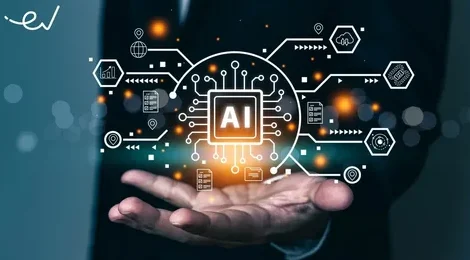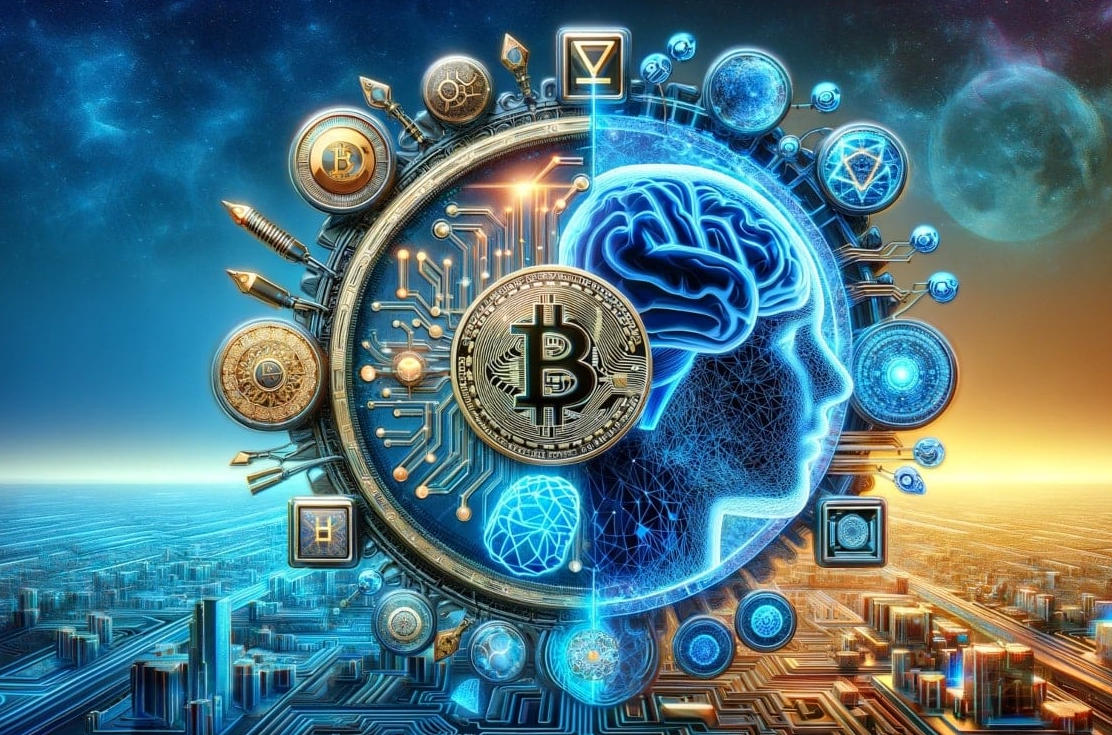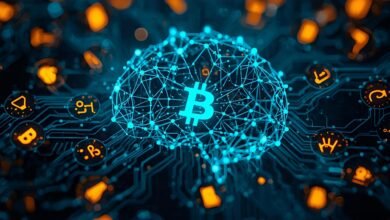
The intersection between cryptocurrency and artificial intelligence (AI) has recently garnered significant interest. Although artificial intelligence has already upended sectors such as retail, finance, and healthcare, its interaction with Blockchain Technology and cryptocurrencies will likely produce a fresh wave of innovation. These two powerful forces are transforming the management of digital assets, security systems, and financial transactions, resulting in a more sophisticated and intelligent ecosystem. AI and cryptocurrencies are laying the groundwork for an automated, distributed, and secure future.
Artificial intelligence is essentially the simulation of human intelligence in machines. It involves the development of systems and algorithms that are capable of learning, reasoning, and making decisions. Artificial intelligence applications include computer vision, predictive analytics, and natural language processing (NLP). Deep learning (DL) and machine learning (ML) are subsets of artificial intelligence that enable systems to learn from data, gradually improving their performance.

Conversely, cryptocurrencies, which run on distributed networks known as blockchains, are digital or virtual currencies. Since they are not controlled by any central authority, unlike conventional currency, cryptocurrencies are more open, secure, and censorship-resistant. Popular instances of digital currencies utilizing blockchain technology for safe and verifiable transactions include Bitcoin, Ethereum, and various altcoins.
Although both artificial intelligence and cryptocurrencies are revolutionary, their convergence creates new opportunities in several areas of the cryptocurrency scene. From security improvements to trading algorithms, artificial intelligence is accelerating, bettering, and making crypto safer.
The unpredictable nature of bitcoin markets makes them a haven for traders seeking to profit from temporary price fluctuations. Artificial intelligence has revolutionized this field, providing traders with tools to analyze market data, identify trends, and make informed decisions in real-time. Artificial intelligence systems can use machine learning algorithms to track social media sentiment, analyse historical data, and accurately forecast price changes.

Based on established parameters, AI trading bots and algorithms can automate the purchasing and selling of Bitcoin. Such automation saves time and lessens emotional decision-making, sometimes resulting in bad investment decisions. These bots capitalize on market fluctuations even as human traders sleep, working around the clock.
Due to its decentralized and immutable nature, blockchain technology provides exceptional security for Bitcoin transactions. However, as cryptocurrencies become increasingly popular, cyberattacks, fraud, and hacking also become more likely. AI enters the picture here.
AI systems can continuously monitor blockchain transactions for indicators of unusual activity or potential fraud. AI can indicate questionable activity—such as double-spending, wallet theft, or phishing scams—using pattern recognition, machine learning, and anomaly detection. Early identification of these hazards will enable artificial intelligence to provide investors and crypto users with even greater security.
Moreover, technologies driven by artificial intelligence might enable blockchain networks to become more scalable. By optimising consensus methods, transaction validation, and data storage, artificial intelligence (AI) helps make blockchain operations more affordable and effective. Blockchain systems can handle a significantly larger transaction volume without compromising security or speed.
Validating transactions and adding them to the blockchain constitutes the resource-intensive process known as Bitcoin Mining. Miners struggle to protect the network through complex mathematical problems; nonetheless, this process consumes a significant amount of computational capability and energy.
Artificial intelligence is revolutionising mining activities. AI can utilize machine learning to predict the most effective approach to solving mathematical problems, thereby reducing energy consumption associated with mining. AI can also monitor the performance and condition of mining hardware, ensuring smooth operations and minimal downtime.
Over time, artificial intelligence may help mitigate some of the environmental issues associated with cryptocurrency mining. AI may reduce the crypto sector’s overall carbon footprint by enhancing mining techniques.
Emerging within the Bitcoin scene, decentralized finance, or DeFi, aims to create open, permissionless financial systems that eliminate intermediaries, such as banks and brokers, by utilizing innovative contracts and decentralized applications (DApps).
Artificial intelligence could transform DeFi by enhancing the cognitive abilities and automation of these systems. By analyzing customer creditworthiness, customizing loan offers, and ensuring adherence to risk management procedures, artificial intelligence can, for instance, enhance distributed lending systems. Furthermore, distributed insurance models based on user behaviour and market conditions can be created using artificial intelligence, which automatically modulates coverage.
Combining artificial intelligence with DeFi enables creators to develop self-sustaining financial systems that are faster and more globally accessible.
Final Thoughts
Although using cryptocurrency and artificial intelligence offers numerous advantages, it also presents several challenges. The potential for market manipulation driven by artificial intelligence raises one of the main issues. AI algorithms can manipulate market mood and prices by analyzing vast volumes of data and executing trades in milliseconds. Such manipulation can lead to market volatility and unfair benefits for individuals who access cutting-edge artificial intelligence technologies. Furthermore, the energy consumption associated with mining cryptocurrencies remains a significant environmental issue.
Mining remains a resource-intensive operation with a considerable carbon footprint, even when optimized with artificial intelligence. The growing demand for cryptocurrency may make the ecological effects of mining a top concern. The legal environment presents still another difficulty. Because cryptocurrencies are decentralized, they are challenging to control; as artificial intelligence technologies gain increasing presence in the crypto scene, new legal and ethical issues will emerge. Regulators will have to strike a balance between encouraging creativity and shielding consumers from the potential hazards associated with the latest technologies.








